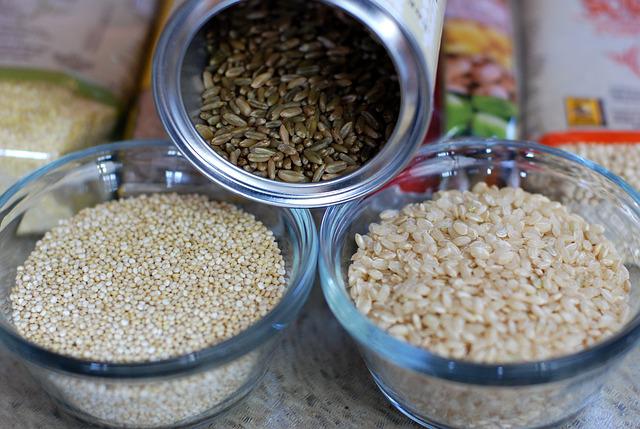High-Fiber Food Puts A Bulk To Your Stool.
High-fiber food is very healthy for the body and its recommended that it be apart of your daily diet.
what is dietary fiber

Roughage, often known as dietary fiber, is a part of plant-derived food that cannot be entirely broken down by human digestive enzymes.
Although fiber comes from plants and is good, it provides little nutritional value but offer health benefits in different ways. High-Fiber food also provide a sense of fullness without containing empty calories. People who consume lots of fiber are consuming stool bulking foods and will have less risk of developing...
- Intestinal disorders
- Colon cancer
- Constipation
- Cholesterol
- Obesity

It is important to know that research comprising around 88,000 women found no significant data regarding consumption of high-fiber food and reduced incidence of colorectal cancer or benign growths.
A study of 58,279 men published in 2010 revealed no link either between dietary fiber and colorectal cancer.
Does that mean that you should stop eating a diet high in fiber? No! Everyone is different and one diet does not fit all, therefore Studies will vary.
Futhermore a nine-year study of 388,000 individuals aged 50 to 71 revealed that those who consumed the most fiber were 22 percent less likely to die.
In addition to a decreased risk of mortality from heart disease, appropriate consumption of fiber-containing foods, particularly grains, was associated with a lower incidence of infectious and respiratory disorders, as well as a lower risk of cancer-related death, particularly among men.
Another 20-year research of Japanese participants aged 40-64 years conducted in 2022 found an inverse link between increasing soluble fiber consumption and a decreased chance of acquiring dementia throughout aging. Don’t stop eating your fiber unless you’re allergic to it.
Which dietary fiber is best
They are two types of fiber, soluble and insoluble. Some people may ask which dietary fiber is better, but at this time, none is better than the other because both serve a special purpose in the body to promote health.
Lets start with soluble fiber and its effects:
Soluble fiber During digestion, attracts water and produces a thick gel, it slows down the stomach from emptying, decreases intestinal transit time, protects carbs from enzymes, and delays glucose absorption which reduces blood sugar level.
It reduces total and LDL cholesterol, potentially lowering the risk of cardiovascular disease. This type of fiber helps to slow the absorption of glucose from the intestines into the blood stream and improves the blood sugar balance.
Insoluble fiber on the other hand helps to regulate blood sugar levels, which may reduce glucose and insulin levels in diabetic individuals and lessen diabetes risk.
Improves regular poop by hastening the flow of meals through the digestive tract.
It adds bulk to the stool, which helps with constipation.
It also helps to bind excess fats and toxins in the digestive tract, to be excreted. This is why high-fiber food is very important and I cannot stress it enough.
high-fiber food chart
| Fruits | Serving size | Total fiber (grams)* |
|---|---|---|
| Raspberries | 1 cup | 8.0 |
| Pear, with skin | 1 medium | 5.5 |
| Apple, with skin | 1 medium | 4.4 |
| Strawberries (halves) | 1 1/4 cup | 3.8 |
| Banana | 1 medium | 3.1 |
| Orange | 1 medium | 3.1 |
| Figs, dried | 2 medium | 1.6 |
| Raisins | 2 tablespoons | 1.0 |
| Grains, cereal & pasta | Serving size | Total fiber (grams)* |
| Spaghetti, whole-wheat, cooked | 1 cup | 6.2 | Barley,pearled,cooked | 1 cup | 6.0 |
| Bran flakes | 3/4 cup | 5.3 |
| Oat bran muffin | 1 medium | 5.2 |
| Oatmeal, quick, regular or instant, cooked | 1 cup | 4.0 |
| Popcorn, air-popped | 3 cups | 3.5 |
| Brown rice, cooked | 1 cup | 3.5 |
| Bread, rye | 1 slice | 1.9 |
| Bread, whole-wheat or multigrain | 1 slice | 1.9 |
| Legumes, nuts & seeds | Serving size | Total fiber (grams)* |
| Split peas, cooked | 1 cup | 16.3 |
| Lentils, cooked | 1 cup | 15.6 |
| Black beans, cooked | 1 cup | 15.0 |
| Lima beans, cooked | 1 cup | 13.2 |
| Baked beans, vegetarian, canned, cooked | 1 cup | 10.4 |
| Sunflower seed kernels | 1/4 cup | 3.9 |
| Almonds | 1 ounce (23 nuts) | 3.5 |
| Pistachio nuts | 1 ounce (49 nuts) | 2.9 |
| Pecans | 1 ounce (19 halves) | 2.7 |
| Vegetables | Serving size | Total fiber (grams)* |
| Artichoke, cooked | 1 medium | 10.3 |
| Peas, cooked | 1 cup | 8.8 |
| Broccoli, boiled | 1 cup | 5.1 |
| Turnip greens, boiled | 1 cup | 5.0 |
| Sweet corn, cooked | 1 cup | 4.2 |
| Brussels sprouts, cooked | 1 cup | 4.1 |
| Potato, with skin, baked | 1 medium | 2.9 |
| Tomato paste | 1/4 cup | 2.7 |
| Carrot, raw | 1 medium | 1.7 |
source: mayoclinic.org
How Much Fiber Should You Have A Day
According to the National Academy of Medicine (NAM) (formerly Institute of Medicine) of the National Academy of Sciences recommends, adult men ages 19-50 should consume 38 grams of dietary fiber per day, men 51 and older should consume 30 grams, women ages 19-50 should consume 25 grams per day, and women 51 and older should consume 21 grams.
These conclusions are based on three studies that found that those in the top percentile of fiber intake had a median of 14 grams of fiber per 1,000 calories and had the lowest risk of coronary heart disease, particularly those who consumed more cereal fiber.
In conclusion: a high-fiber diet is essential for the body and may vary in it's effectivness depending on the person. All studies that are done on dietary fiber may vary, so if you are allergic to any type of soluble or insolube fiber seek your doctor.
sources :
American Journal of Clinical Nutrition
Could you really Enjoy Life without Good Health? The answer is NO!
"A man may have many riches with pleasure, but bad health can strip you of them."

By eating a variety of fruits, you will get most of the nutrients the body needs.
Keep eating those fruits!
Do you know Indigestion Is bad For Your Health?
Many people have problems with indigestion today, and its one of the reason why food becomes toxic in the stomach.

Apple, the master of all fruits. You have heard it, "an apple a day keeps the doctor away." Apples are very high in antioxidants which fights against free-radicals.

Make sure you eat your vegetables daily. they have what you call "phytonutrients"a chemical that fights against cancer. vegetables are nature's best health food.

1.Water keeps your temperature normal.
2.Lubricates your joints.
3.Protects your spinal cord and sensitive tissues.
4.Gets rid of waste through urination.
New! Comments
Have your say about what you just read! Leave me a comment in the box below.